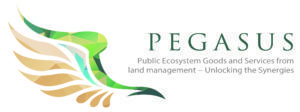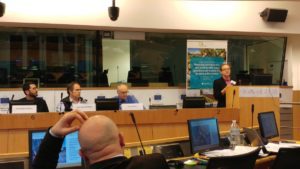PEGASUS Final Conference: How EU Agriculture and Forestry provide Public Goods & Ecosystem Services
©IEEP
The Committee of Regions in Brussels hosted the final conference of the “PEGASUS” project “Delivering environmental and social benefits from agriculture and forestry in a changing policy context” on 7th of February.

© PEGASUS
PEGASUS stands for ‘Public Ecosystem Goods And Services from farming and forestry – Unlocking the Synergies.’
The Horizon 2020 project brought together 14 organisations of 10 different EU countries, connecting experts from various disciplines including ecologists, rural sociologists, economists, geographers, policy analysts from academic institutions as well as NGOs and think tanks. Action research was at the heart of PEGASUS.
Objective of the research project was to develop innovative approaches and new ways of thinking about the way farmland and forests are managed, in order to stimulate a long-lasting improvement in the provision of public goods and ecosystem services from agricultural and forest land in the EU.
EUROPARC Brussels attended this event, to learn about the project’s results and to look for possible synergies between the outcomes and the Federation’s engagement to support approaches how sustainable agriculture and nature conservation can benefit each other.

© PEGASUS
The PEGASUS project adopted a strong participatory approach involving and engaging with both public and private stakeholders throughout its research process, to better understand – and tackle – the range of policy and practical challenges faced in different contexts.
Research was carried out widely, sourcing around 35 case studies, thus covering a wide spectrum of territories, sectors, management systems, etc. Aims were to examine the issues faced when trying to ensure effective provision of public goods and ecosystem services from farming and forest activities; and when working to find solutions allowing for the long term economic social and environmental sustainability of the EU’s farm and forest areas.
The debate during the conference showed that
the link between Protected Areas and agricultural actors cannot be overestimated – how the positive attitude of park managers is crucial to achieve fruitful and positive partnerships.
Throughout the project, a set of toolkits providing guidance and useful tips was synthesized from the experiences gathered. Valuable lessons can be learned from the toolkit ‘’Working Together to Build a Successful Initiative’’: a guidance and compendium of ideas for planning your own local initiatives or projects, encouraging more sustainable farming and forestry. It offers support to those who wish to involve stakeholders in collective actions towards enhancement of the provision of environmental and social benefits from agriculture and/or forestry.
The PEGASUS project results offered profound ‘’food for thought’’ for EUROPARC activities on sustainable agriculture in Protected Areas
The case studies collected, featured several Protected Areas – such as:
- Agriculture and forestry in Parc National des Cévennes in France
- Agriculture in natural parks in the Marche region in Italy
- Organic farming label in the mountain Murau region
- Social-Ecological Systems in the Biosphere Reserve Lungau
Find here all final conference presentations and workshop results derived throughout the project phase.
The freshly published toolkit is available for download here.
More background can be found on the dedicated PEGASUS website.
The final report can be accessed here: PEGASUS Final Conference – Highlights.